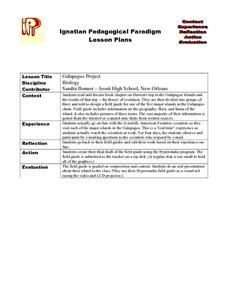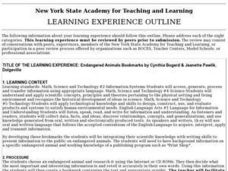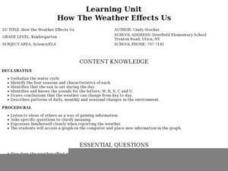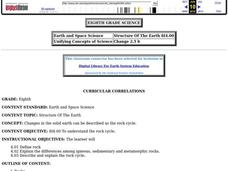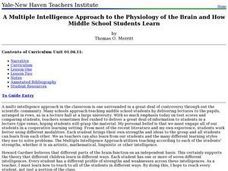Curated OER
Women's Brains
Middle schoolers experience an example of bias in science dealing with women and gender.
Curated OER
Galapagos Project
Students explore Darwin's trip to the Galapagos Islands. In groups, students create a field guide for one of the five major islands in the Galapagos.
Curated OER
Endangered Animals Bookmarks
Pupils conduct research on various endangered animals. They conduct Internet research, create a bookmark with information about their selected animal, and sell the bookmarks to raise money for an organization dedicated to endangered...
Curated OER
Waddle You Know About Penguins
Second graders study the similarities and differences of the seventeen species of penguins. They investigate habitats and how these habitats are suited to each species characteristics. They see how animals adapt to their environments.
Curated OER
How The Weather Effects Us
Students discover how weather affects their lives. They review the climates of Florida, Alaska and New York. They need choose the place they would most like to live in based on the climate of that state.
Curated OER
The Forecast Factory
Pupils role play weather forecasting activities. They investigate weather forecasting processes such as equations, data analysis, announcing by role playing in a large lecture hall.
Curated OER
Keep the Environment Clean
Students discuss ways our environment becomes polluted. They make a list of ways to keep it clean.
Curated OER
Oceanography (Rivers and Streams)
Second graders examine the characteristics of streams and rivers. They identify the types of resources lakes, ponds and oceans provide. They ask questions to complete the activity.
Curated OER
Meteorology (Condensation)
Second graders define condensation and evaporation. They identify and describe the steps in the water cycle. They ask questions to end the lesson.
Curated OER
Plants
Third graders study the factors necessary for plant growth and how plants adapt to their environment. They examine ow different plants require different environments to thrive.
Curated OER
Ocean Currents
Fourth graders work in groups to research ocean currents and create posters with their findings. They locate the patterns and names of major ocean currents and identify them on a map. Students also use red pencil to show ocean currents...
Curated OER
Oceanography: Understanding the Relationship Among Ocean Food Chains
Fourth graders explore relationships among organisms involved in ocean food chains to investigate interdependence of the organisms.
Curated OER
Oceanography
Fourth graders define new vocabulary associated with oceanography. They locate and label the four oceans. They also identify features of the ocean floor.
Curated OER
Structure of the Earth
Sixth graders examine the layers of the Earth and the changes that take place on a daily basis. They look at the layers of a boiled egg to relate them to the layers of the Earth.
Curated OER
Structure of the Earth
Sixth graders define atmosphere and hydrosphere, explore through experimentation how the atmosphere was formed, and describe the layers of the Earth's atmosphere and their distances.
Curated OER
Earth's History
Seventh graders study the law of superposition by creating models of fossils in layers of rock. They examine how fossils are usually found in sedimentary rock which leads to the study of geologic history in those rocks.
Curated OER
Population Dynamics
Middle schoolers discover how organisms are dependent on one another for survivial. They also discuss how to conserve natural resources. They compare and contrast the different types of symbiotic relationships as well.
Curated OER
Ecology and the Conservation of Natural Resources
Students examine the habits of various organism and evaluate the need for conserving natural resources. They role-play as migrating birds traveling between habitats encountering hazards along the way. They observe animals in a...
Curated OER
Ecology: Factors Influencing Animal Populations
Pupils assess the factors affecting animal populations. Working in groups they define specific vocabulary terms and complete several activities from "Project Wild."
Curated OER
Structure of the Earth
Eighth graders describe and identify the three layers of the Earth. They work together to construct their own earth model. They share their creation with the class.
Curated OER
Solar System
Eighth graders identify the basic concepts of celestial bodies. They discover the difference between perihelion and aphelion and demonstrate how the universe is expanding. They also discover how gravity and centrifugal force are...
Curated OER
Structure of the Earth
Eighth graders explain the difference between igneous, sedimentary and metamorphic rocks. They identify the stages in the rock cycle. They discover the origin of rocks as well.
Curated OER
A Multiple Intelligence Approach to the Physiology of the Brain and How Middle School Students Learn
Students draw a poster of a lateral view of the brain in order to label the different lobes of the brain. They examine what causes some people to be more musically intelligent than others. They dissect a cow's brain and label the...
Curated OER
A Guide Through the Culture of the Blues
Learners examine the history of blues music and discover how it relates to the music of today. As a class, they listen to the drum songs of Africa and compare it to the use of drums in pop music today. Using the internet, they research...



